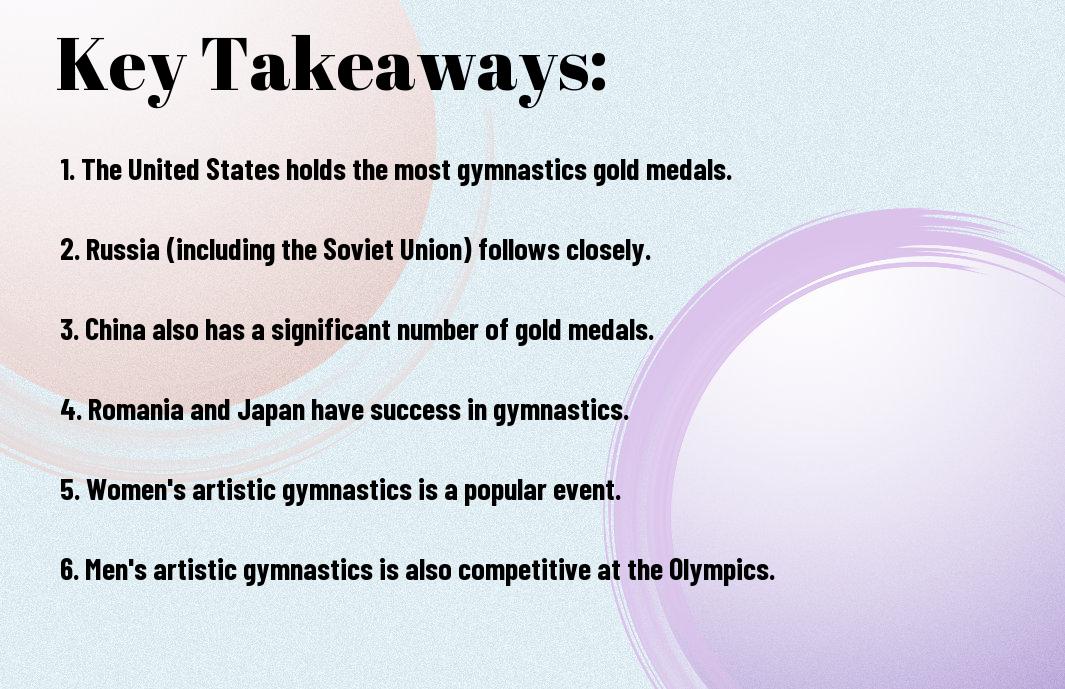When considering dominance in the world of Rugby, you must be curious about which country stands out as the ultimate champion. The Rugby World Cup is a battleground where nations come together to fight for glory, and in this article, you will discover which country has emerged victorious the most number of times. Strap in and get ready to explore the thrilling world of Rugby history!

Key Takeaways:
- New Zealand has won the most Rugby World Cups, with a total of 3 victories in 1987, 2011, and 2015.
- Australia is the second most successful team in Rugby World Cup history, having won the tournament twice in 1991 and 1999.
- South Africa is tied with Australia for the second most Rugby World Cup victories, also winning the tournament twice in 1995 and 2007.

A Brief History of the Rugby World Cup
The
inaugural tournament
Rugby World Cup was held in 1987 in New Zealand and Australia. Sixteen teams participated in the inaugural event, with the All Blacks emerging as the first champions of the Rugby World Cup. This historic tournament set the stage for what would become one of the most prestigious events in the world of rugby.
Evolution of the competition
Over the years, the Rugby World Cup has grown in popularity and significance, with more teams competing and fans from around the globe tuning in to witness the thrilling matches. The tournament expanded to include more nations, leading to greater diversity in playing styles and competition levels. Host countries have also varied, showcasing the global nature of the sport and allowing different cultures to come together in celebration of rugby.
Plus, the format of the Rugby World Cup has evolved to become more competitive and intense. The introduction of knockout stages added to the drama of the tournament, with teams having to bring their A-game in every match to progress further. The evolution of the competition has made the Rugby World Cup a truly spectacular event that captures the hearts of rugby enthusiasts worldwide.
The Most Successful Teams
New Zealand’s Dominance
Most rugby enthusiasts would agree that when it comes to Rugby World Cup success, New Zealand stands out as the dominant force. The All Blacks have a stellar record in the tournament, having won the prestigious title a total of three times.
Australia’s Consistent Performance
Australia’s rugby team has also shown remarkable consistency in the Rugby World Cup. With two championship wins and being runners-up on two occasions, the Wallabies are a team you can always expect to perform well on the world stage.
Consistent performances in the Rugby World Cup have solidified Australia’s reputation as a formidable contender. Their unwavering dedication and skilled squad make them a team that you can never underestimate.
South Africa’s Resurgence
To witness a resurgence in rugby prowess, look no further than South Africa. The Springboks have experienced a remarkable journey in the Rugby World Cup, culminating in three championship victories. Their resurgence from underdogs to champions is a testament to their tenacity and skill on the field.
Africa’s rugby powerhouse, South Africa, has shown the world that determination and resilience can lead to remarkable achievements in the sport. Their rise to dominance in the Rugby World Cup is a story that inspires all who follow the game.

The Current Champions
Many nations have vied for the prestigious title of Rugby World Cup champions, but one team stands above the rest in recent years – New Zealand. In 2015, the New Zealand rugby team, known as the All Blacks, emerged victorious in a thrilling final match to claim their third Rugby World Cup title.
New Zealand’s 2015 Victory
Zealands’ performance throughout the 2015 tournament was nothing short of dominant. The team displayed exceptional skill, teamwork, and determination as they faced tough competitors on their journey to the final. Led by their inspirational captain, Richie McCaw, the All Blacks showcased their trademark blend of physicality and finesse, thrilling fans and proving themselves as worthy champions.
Their Road to the Final
To reach the final, New Zealand had to navigate through a challenging path, meeting formidable opponents along the way. Their victories over strong teams like South Africa and Australia in the knockout stages solidified their reputation as a powerhouse in world rugby. The All Blacks’ determination and resilience were on full display, as they overcame obstacles and delivered stellar performances when it mattered most.
Their unwavering focus and unwavering commitment to excellence propelled them to the pinnacle of success, culminating in a memorable final match that showcased their mastery of the sport. The All Blacks’ 2015 Rugby World Cup victory solidified their status as one of the greatest rugby teams in history, etching their name in the annals of the sport’s elite champions.
The Most Titles Won
Now, let’s examine into which country has won the most Rugby World Cups. New Zealand stands out with their impressive three-peat victories in the Rugby World Cup. The All Blacks, as they are famously known, clinched the title in 1987, 2011, and 2015, showcasing their dominance on the world stage. With a rich rugby heritage and a strong tradition of excellence, New Zealand’s achievements in the tournament are unparalleled.
New Zealand’s three-peat
Titles: New Zealand’s three consecutive wins in the Rugby World Cup underline their legendary status in the sport. The All Blacks’ relentless pursuit of perfection and their ability to perform under pressure have set them apart from other teams. Their historic triumphs in 1987, 2011, and 2015 cement their reputation as one of the greatest rugby nations of all time.
Australia’s back-to-back wins
Most. Australia also boasts an impressive record in the Rugby World Cup, with back-to-back victories in 1991 and 1999. The Wallabies’ triumphs in these tournaments showcased their skill, resilience, and determination to succeed on the world stage. Their consecutive wins solidified Australia’s reputation as a rugby powerhouse and added to the country’s storied rugby legacy.
This exemplary feat by Australia in winning consecutive titles highlights the country’s depth of talent and its ability to consistently perform at the highest level. The Wallabies’ back-to-back victories in 1991 and 1999 remain a testament to their enduring quality and competitiveness in the Rugby World Cup arena.
Notable Performances
South Africa’s 2019 triumph
One of the most remarkable performances in Rugby World Cup history was South Africa’s triumph in 2019. The Springboks overcame various challenges on and off the field to clinch their third Rugby World Cup title. Led by their inspirational captain Siya Kolisi, South Africa’s victory united a nation and showcased the power of sport to bring people together.
With a dominant display in the final against England, South Africa’s physicality, tactical prowess, and unwavering determination proved too much for their opponents. The team’s triumph highlighted the resilience and spirit of South African rugby, making it a memorable and historic moment in the tournament’s history.
England’s near-misses
Any discussion about notable performances in the Rugby World Cup would be incomplete without mentioning England’s near-misses. Despite being one of the traditional powerhouses of the sport, England has experienced heartbreak in multiple Rugby World Cup campaigns, coming agonizingly close to lifting the Webb Ellis Cup.
Rugby World Cup Statistics
After exploring the List of Rugby World Cup finals, you can look into the intriguing world of Rugby World Cup statistics. From the number of appearances to top scorers and the most tries scored, these statistics offer a detailed look at the history of the tournament.
Most Appearances
One of the fascinating aspects of Rugby World Cup statistics is tracking the players with the most appearances in the tournament. These dedicated athletes have showcased their talent and commitment on the world stage, earning admiration and respect from fans worldwide.
Top Scorers
Most rugby fans are familiar with the thrill of watching top scorers dominate the field during the Rugby World Cup. These skilled players have the remarkable ability to put points on the board and lead their teams to victory, making them legends of the sport.
Scorers like Jonny Wilkinson and Dan Carter have left an indelible mark on the Rugby World Cup with their impressive scoring records, cementing their places in the annals of rugby history.
Most Tries Scored
Statistics on the most tries scored in Rugby World Cup history offer a glimpse into the dynamic nature of the sport. With each try, players demonstrate athleticism, speed, and strategic prowess, providing spectators with unforgettable moments of excitement and skill.
With legends like Jonah Lomu and Bryan Habana among the top try-scorers, the Rugby World Cup has seen incredible displays of talent that will be celebrated for generations to come.
Summing up
After exploring the history of the Rugby World Cup winners, you can see that New Zealand has emerged as the country with the most titles, having won the prestigious tournament a total of three times. Their dominance in the sport is evident through their consistent performances and strong team presence in the rugby world.
While New Zealand stands out as the most successful nation in the Rugby World Cup, it is important to acknowledge the other countries that have also made their mark in the tournament. Each team’s journey and achievements in the competition have contributed to the rich tapestry of rugby history, making the Rugby World Cup a truly special and revered event in the world of sports.
FAQ
Q: Which country has won the most Rugby World Cups?
A: New Zealand has won the most Rugby World Cups, with a total of three wins in 1987, 2011, and 2015.
Q: How many Rugby World Cups has New Zealand won in total?
A: New Zealand has won a total of three Rugby World Cups, making them the most successful team in the tournament’s history.
Q: Which country has won the second most Rugby World Cups?
A: Australia and South Africa are tied for winning the second most Rugby World Cups, with both countries having two wins each.




